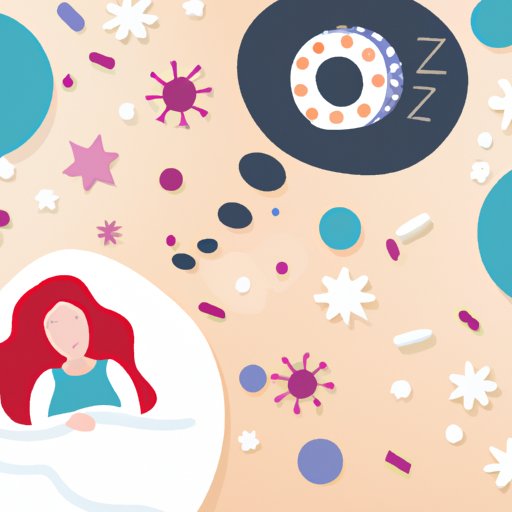I. Introduction
Do you find yourself tossing and turning in bed, unable to drift off to sleep? Millions of people worldwide suffer from insomnia, a sleep disorder that can have negative impacts on mental and physical health. In this article, we’ll explore the science behind insomnia, common triggers for nighttime wakefulness, and top solutions for falling asleep faster. We’ll also discuss the importance of a healthy diet and lifestyle for promoting quality sleep, as well as the link between mental health and insomnia. Lastly, we’ll cover when it may be necessary to seek professional medical treatment for insomnia, and the surprising connection between sleep deprivation and physical health.
II. The Science behind Insomnia: Understanding Why You Can’t Sleep
Insomnia is a sleep disorder characterized by difficulty falling asleep or staying asleep. There are two types of insomnia: acute and chronic. Acute insomnia is short-term and often caused by a specific life event such as stress or travel, while chronic insomnia is long-term and can be the result of an underlying medical condition or lifestyle factors like poor sleep hygiene.
The body’s circadian rhythm, or internal 24-hour clock, greatly influences sleep patterns. Certain hormones, like melatonin, play a role in regulating the sleep-wake cycle. Disruptions in the circadian rhythm, such as those caused by irregular sleep schedules, can contribute to insomnia. Sleep is also essential for overall health and wellbeing as it allows the body to repair and restore itself. Chronic insomnia can lead to serious health conditions such as high blood pressure, heart disease, and depression.
III. Exploring Common Triggers for Nighttime Wakefulness
There are many factors that can contribute to insomnia. Stress and anxiety are common culprits, as racing thoughts and worries can make it difficult to wind down and relax. Certain medications, such as antidepressants and stimulants, can interfere with sleep as well. Environmental factors such as noise and light can also disrupt sleep. Before bed, try to create a quiet, dark, and cool sleep environment to promote quality rest.
IV. Top Solutions for Falling Asleep Faster: Tips for a Better Night’s Rest
Improving sleep hygiene can help you fall asleep faster and stay asleep for longer. Start by establishing a regular sleep routine and sticking to it as closely as possible each night. Create a relaxing environment that’s conducive to sleep by keeping the room cool, quiet, and free of electronic devices. Avoid stimulating activities before bed, like watching TV or scrolling through social media. Instead, try practicing relaxation techniques like meditation or deep breathing exercises which can significantly reduce stress and anxiety levels. Additionally, avoid caffeine and alcohol before bed, as these can interfere with sleep quality.
V. How Your Diet and Lifestyle Choices May Be Affecting Your Sleep Quality
Your diet and lifestyle can significantly impact your sleep quality. Consuming large amounts of caffeine, especially later in the day, can make it difficult to fall asleep at night. Alcohol may make you initially drowsy but can disrupt sleep later in the night. Lack of exercise can also contribute to insomnia. Make healthy lifestyle choices by avoiding caffeine after midday, limiting alcohol intake, and incorporating physical activity into your daily routine.
VI. The Role of Anxiety and Depression in Chronic Insomnia
It’s no secret that anxiety and depression can impact sleep quality. These mental health conditions can cause racing thoughts and emotional disturbances that make it difficult to fall asleep and stay asleep. Practicing relaxation techniques, like deep breathing exercises and meditation, can help alleviate anxiety and depression symptoms, promoting better sleep.
VII. Dealing with Insomnia: When to Seek Professional Medical Treatment
If you’ve tried improving your sleep hygiene and making lifestyle changes, but still struggle with insomnia, it may be necessary to seek professional medical treatment. Your doctor may recommend medication or therapies like cognitive-behavioral therapy to help manage insomnia. It’s important to address insomnia as unresolved sleep deprivation can have serious impacts on physical health and mental wellbeing.
VIII. The Surprising Connection Between Sleep Deprivation and Physical Health
Chronic sleep deprivation can have negative impacts on physical health, increasing the risk of developing conditions like obesity, heart disease, and diabetes. When we sleep, our bodies release hormones that play critical roles in metabolism and maintaining a healthy weight. Lack of sleep also compromises the immune system’s ability to fight off infections and viruses. Prioritizing sleep is not just important for ensuring adequate rest but also for promoting overall health and wellbeing.
IX. Conclusion
For those struggling with insomnia, it can sometimes feel like there’s no relief in sight. However, by better understanding the science behind this sleep disorder and implementing lifestyle changes, you can improve the quality and quantity of your sleep. Relaxation techniques like meditation and deep breathing exercises can significantly reduce anxiety and depression symptoms, promoting better sleep. If necessary, don’t hesitate to seek professional medical treatment for chronic insomnia. Ultimately, prioritizing quality sleep is essential for overall health and wellbeing.
